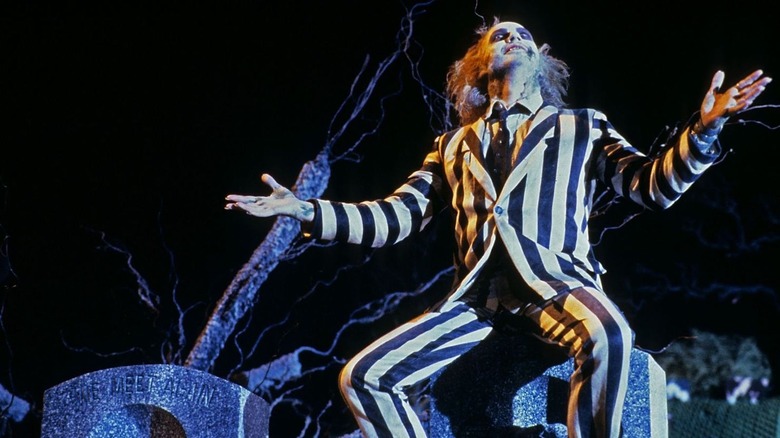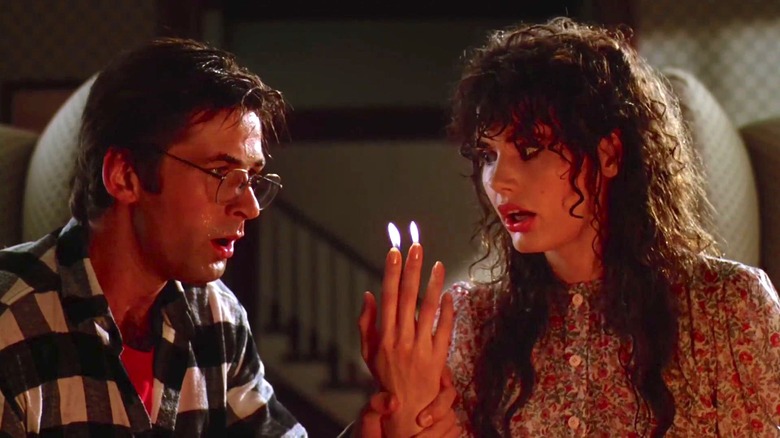Even Tim Burton Didn't Fully Understand Beetlejuice
Tim Burton's horror/comedy "Beetlejuice" was surprising when it was released in 1988. The plot follows a kindly couple named the Maitlands (Alec Baldwin and Geen Davis) who live in a beautiful small town far away from any big city. They are blissfully married and enjoy books and crafts. The Maitlands die in a car wreck, becoming ghosts who have to slowly figure out the rules of the afterlife. Shortly thereafter, a gaggle of obnoxious yuppies move into their home, and the Maitlands prove ineffectual at scaring them away; the vintage sheets they wear as their makeshift death shrouds aren't exactly terrifying to a zonked-out art snot (Catherine O'Hara) dizzy with valium. The yuppies' Goth daughter Lydia (Winona Ryder) is the only one who can see the Maitlands outside of their shrouds, and is more bemused that she's living with ghosts than scared.
Eventually, the Maitlands have to enlist the haunting skills of Betelgeuse (Michael Keaton), a crass, ancient ghost who claims to be a specialist in "bio-exorcisms," that is, scaring living people out of haunted houses.
The surprising thing about "Beetlejuice" was its bonkers aesthetic and wild production design. Burton has a gloriously broad imagination and created an afterlife that looks like a glowing carnival but is, in fact, a dull bureaucracy. It's a beloved film to this day. It favors warmth over fear, but it's a twisted, Goth form of warmth. Death is not a poem, the film argues, but a line at the DMV. It's not to be worshiped but embraced as part of life.
Just don't ask Burton what the film's about. In Geena Davis' autobiography "Dying of Politeness: A Memoir," the actress recalled a conversation with her director where he revealed that, well, he didn't really "get" "Beetlejuice."
I get it
The screenplay for "Beetlejuice" was written by Warren Skaaren ("Beverly Hills Cop 2") and Michael McDowell ("Tales from the Darkside: The Movie"). It's a clever script, bolstered by Burton's haunted merry-go-round aesthetics. Burton, however, only seems to make movies as good as their screenplays. The director has admitted in interviews that he can't tell the difference between a good script and a bad script, and will simply shoot what's handed to him. Typically, Burton makes films about wistful, death-obsessed outsiders. As many of his films are beloved as are derided, likely depending on the quality of the scripts.
When Davis approached Burton about how much she understood the screenplay of "Beetlejuice," the director responded with relief more than mutual understanding. Davis wrote that she approached Burton and said:
"I just want you to know, I get this movie, I really get it. [...] Later, he would tell me that one of the reasons he cast me was because he wasn't sure he really got the movie, so it might be handy to have someone around who was very sure they knew what it was about."
Yes, it's entirely possible, even common, for directors to misunderstand or even be baffled by their own work. Burton seems more interested in visuals and music than theme. Indeed, there are many directors (David Lynch, Aki Kaurismäki) who staunchly refuse to discuss the "meaning" of their work, feeling that their filmmaking is all that is needed.
Davis doesn't state what she "got" about "Beetlejuice," but the script seemed to impress her. Regardless, Burton and Davis made a pretty impressive film together. Sadly, they have made no films together since.
"Beetlejuice 2" is currently in production and will likely be released in theaters in September of 2024.

